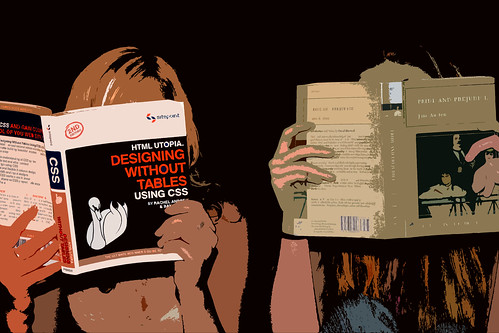 I wrote the following essay for my college composition class freshman year (so please forgive the poor/formal writing style!) about Richard Rodriguez’s autobiographical exploration about the end of his education. I was reading over it the other day and realized that some of the main ideas in this paper would be interesting to revisit now that I’ve graduated college and am trying to find ways to continue learning in a post-formal-education life.
I wrote the following essay for my college composition class freshman year (so please forgive the poor/formal writing style!) about Richard Rodriguez’s autobiographical exploration about the end of his education. I was reading over it the other day and realized that some of the main ideas in this paper would be interesting to revisit now that I’ve graduated college and am trying to find ways to continue learning in a post-formal-education life.I discovered while reading Richard Rodriguez’s “The Achievement of Desire” that there is a stark difference between what I believe he refers to as the “end of education” and what I believe the “end of education” to truly be. Rodriguez’s education is not life-long learning, but rather an education ending with the end of formal education.
It has always been the idea in my mind that you never stop learning until you die. My grandfather has been the prime example in my life. He has been educating himself (teaching himself how to captain a ship and living on a boat for years, starting his own business, learning to speak Italian fluently, always reading a book about a topic of interest to him, taking up woodworking, and becoming an expert on ancient Egyptian culture including the language, art, and music) for as long as I can remember up until the present day. Out of passion comes a desire to surround yourself by everything that is the cause of that passion. If you are passionate about life, you will strive to surround yourself by everything that life has to offer.
In Mary Louise Pratt’s essay, “Arts of the Contact Zone,” she describes a new Cultures, Ideas, Values class: “It was the most exciting teaching we had ever done, and also the hardest… (who can forget Atahuallpa throwing down the Bible because it would not speak to him?)…Along with rage, incomprehension, and pain, there were exhilarating moments of wonder and revelation, mutual understanding, and new wisdom—the joys of the contact zone.” Without any passion in education, a contact zone would ultimately fail. Without passion, nobody in the classroom would speak strongly about anything (given they speak at all), and would therefore not become a place of sharing of ideas, and certainly nothing of the sort of classroom experience Pratt describes. A contact zone classroom is often a difficult place to be, but the way in which Pratt speaks of her situation, it also sounds like a wonderfully passionate place to be and to share with others.
The most passion comes from sharing my ideas with others who are interested in the same things as me. Since Rodriguez read and studied alone in the library, he rarely shared his ideas by talking to others. In fact, he “began to wonder: Who, besides my dissertation director and a few faculty members, would ever read what I wrote?” Following that thought he yearns for a more passionate life. If he were able to share what he wrote with the world, maybe he would have found passion somewhere in his thoughtfulness.
Rodriguez just never truly loved anything he studied but himself. His autobiographical essay did not show any passion about that which he studied, researched, or wrote about. Instead, his passion appears just through writing his own story about his own life. He has underestimated the role life-long learning has played in his own life. Although his autobiography mediates on how he has reached the end of his education, without even knowing it, Rodriguez managed to learn a great deal about himself and the world around him just by simply writing his own story. We can see this by the way his own perspectives have changed throughout the course of his life story. Rodriguez just needed to find his passion.
In the end, it is only fair to say that each individual has their own goal, or end, of education. As my grandfather has said, we will be of more service to our community as well-rounded individuals in life than as an individual with nothing more than a formal education degree. We all give our own meaning to life, but in order to have a life, you have to continue to explore life, and do so passionately.
A lot of us are out of school or about to be out of school. Do you feel like your education is over or that instead it has just begun? How has sharing and conversing about ideas (whether through a blog/twitter, an interest group, over a beer, etc.) helped you to continue learning post-college? And how do YOU explore life passionately?


